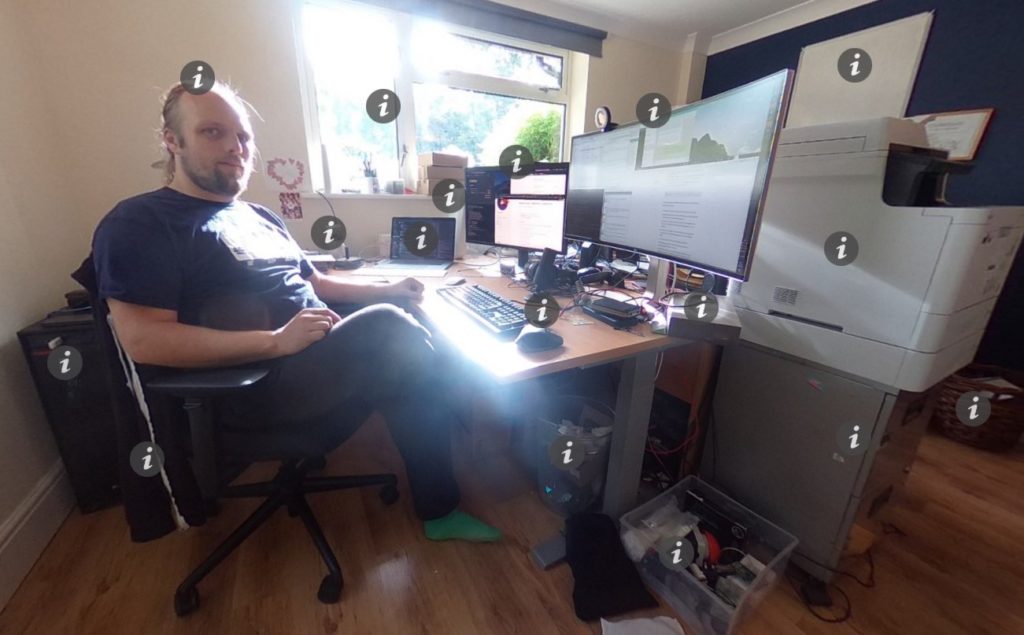If you enjoy a bit of “cable gore”, let me introduce you to the fusebox cupboard at my house, with its plethora of junctions, fuses, breakers, switches, timers, and cabling everywhere! Banana for scale.
Tag: buying a house
Dan’s Office (360° Panoramic)
This week, some colleagues at Automattic and I are sharing pictures of our workspaces. So I made a 360° panoramic with interactive “info points” (apologies for work-specific jargon). Would you like to see it?
Buying A House, Part 6
This blog post is the sixth and final part in a series about buying our first house. In the fifth post, we finally exchanged contracts with the sellers after a long-running disagreement about who was going to repair the front door…
A series of days flew by in a cardboard-box-filled blur, and suddenly it was the last Friday in July – the day upon which our sale was completed. I’d run out of spare days of annual leave, so I was only able to justify taking the afternoon off to pick up a van, scoop up Ruth and Matt, get the keys to the new house, and meet JTA there.
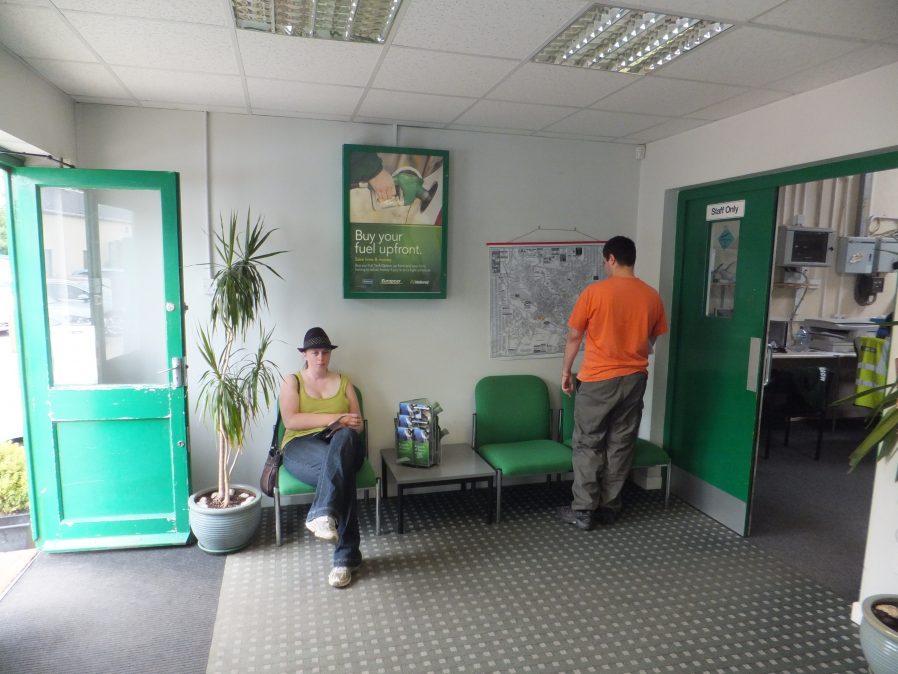
The estate agents were conveniently just two doors down from a locksmith, so we got some keys cut to what we believed to be the new front door, while we were there. It’s also sandwiched between a funeral home and a florist, which makes it sort of a one-stop street when somebody dies and you want to put their house on the market.

We soon discovered that the “fix” that had ultimately been applied to the broken front door was simply to swap it for a different exterior door, from the inner porch. A little cheeky, and a little frustrating after all the fighting we’d done, but not the end of the world: we still had a perfectly good front door and – as we planned to use the annex as part of the main house, anyway, we were happy to take the door down and leave an open doorway, anyway.
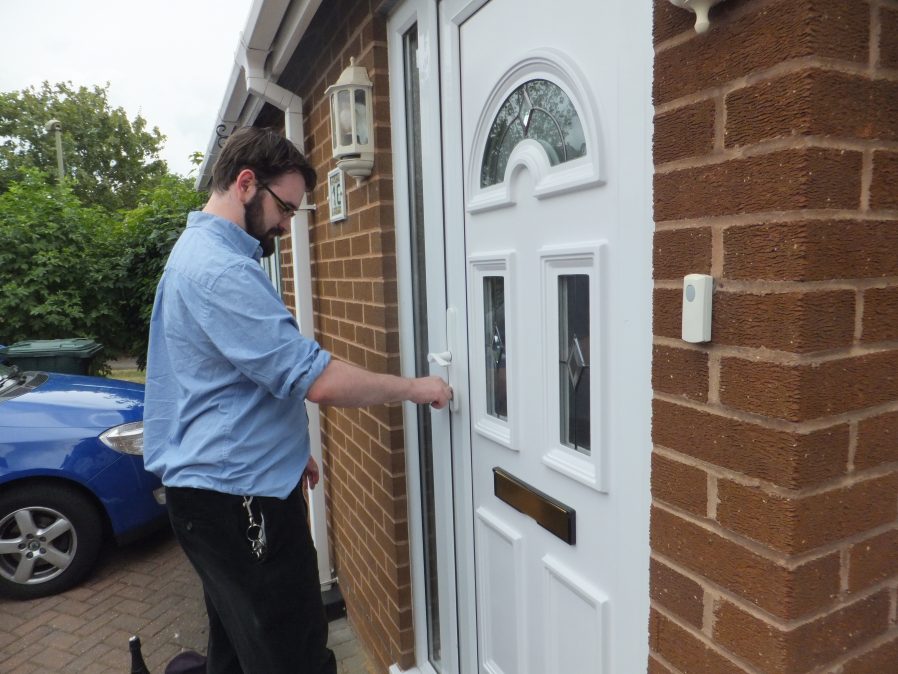
A vacant house feels big and empty. Our new – large! – living room felt enormous. Meanwhile, packing up our old house – with its painted walls and wooden floors – was beginning to sound echoey as it became emptier.
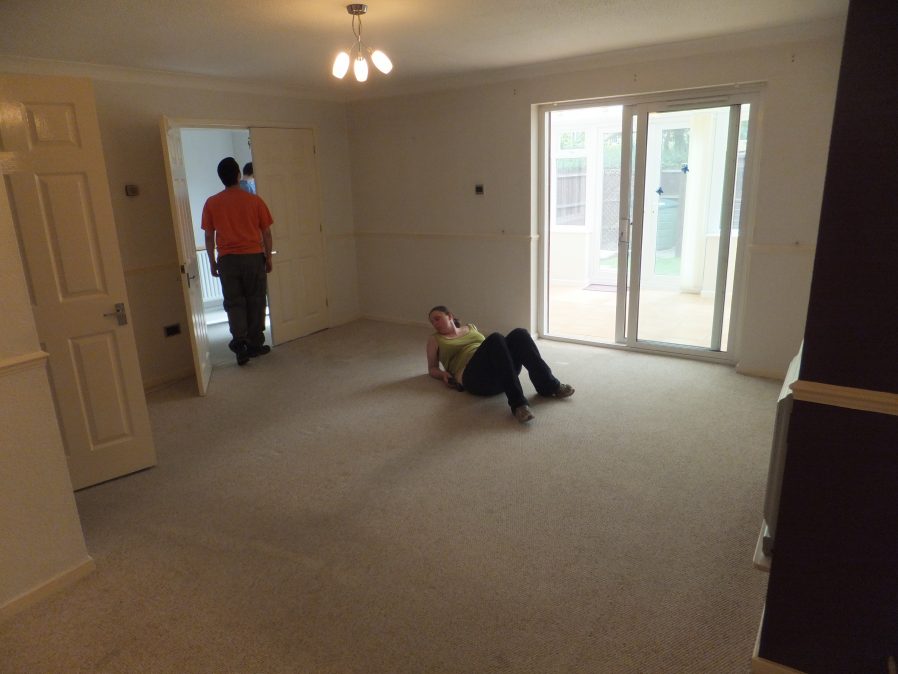
We spent a long time working out which of the many keys we had fit which of the locks, as there were quite so many: there’s the front door, the inner front door, the other inner front door, the back door, the outer conservatory door, the inner conservatory door, the gate lock, the shed lock, the window locks, and a good handful of keys besides that we still haven’t identified the purpose of. It’s was like the previous owners just bought a pile of additional keys, just as a prank.
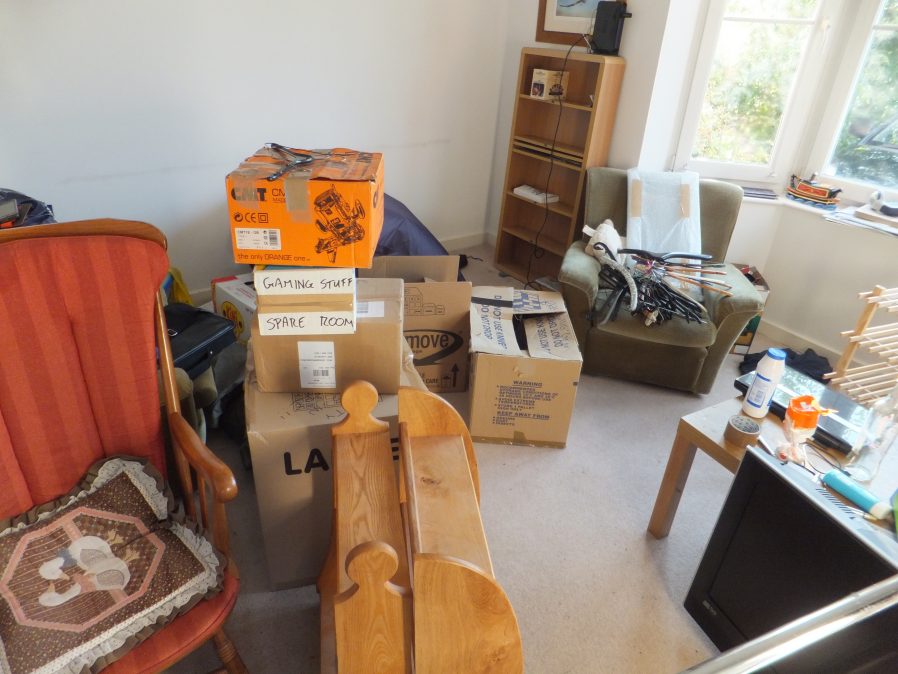
We’d rented a van over a long weekend in which to do the majority of the move, and we’d hired some burly men with a bigger van to move some of the heaviest furniture, and to collect a piano that we’d bought (yes, we have a piano now; booyah).
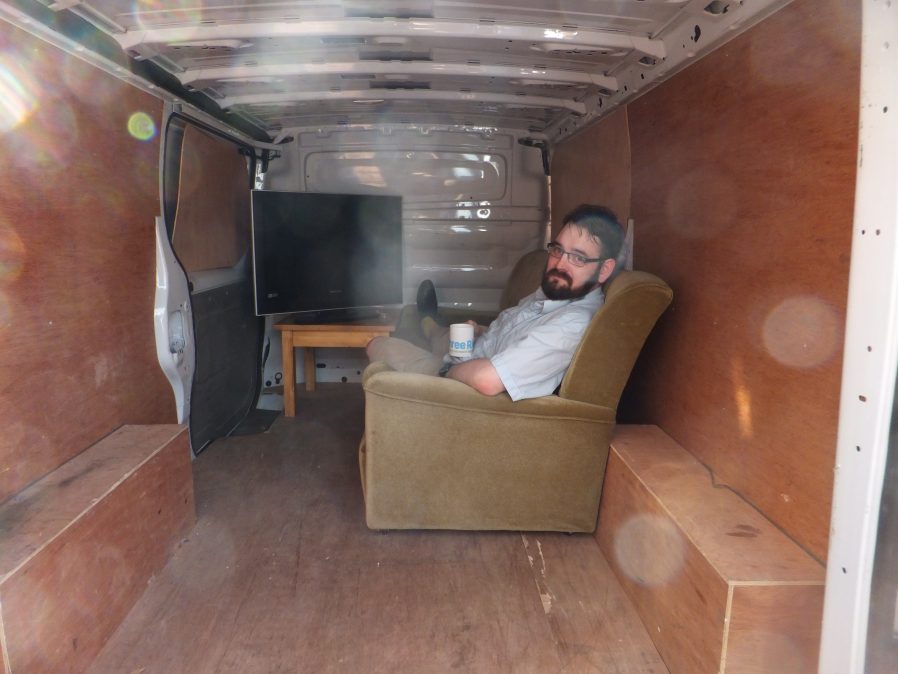
Very helpfully, Alec came and joined us, and helped run an enormous amount of boxes and furniture down and out of the three-stories of our old house, and in and up the three-stories of our new house. Why do we keep torturing ourselves with these tall buildings? At least our new staircases are a better shape for carrying mattresses up.
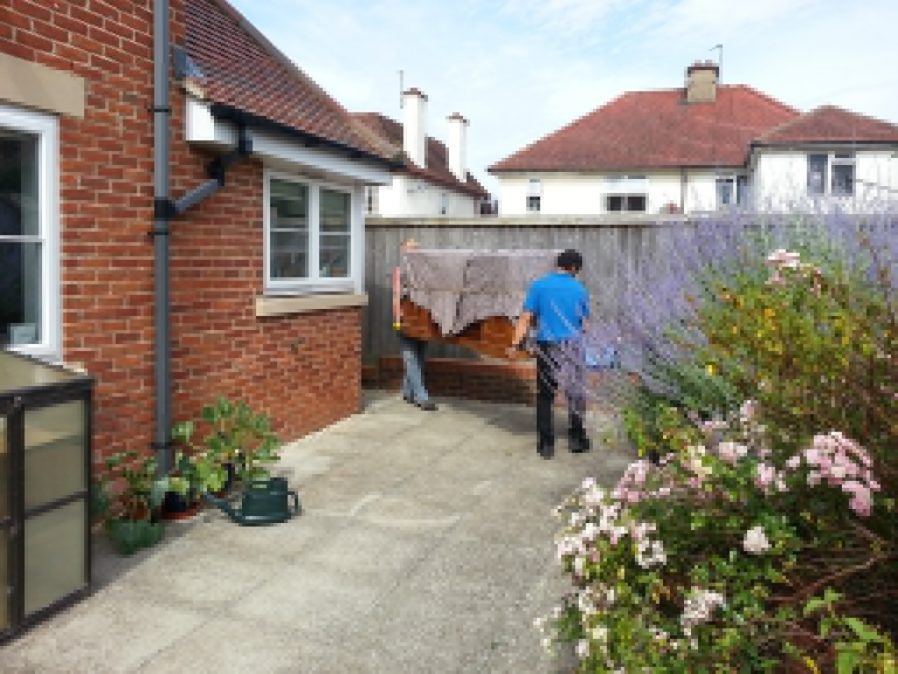
The weather stayed good, with only occasional showers (and thankfully, never when we were carrying soft furnishings between a van and a building) and one brief but wild thunderstorm (that we managed to avoid only with a quick re-arrangement of the van contents, slamming the doors, and sprinting for cover), and we worked hard, and we ended up a day ahead of schedule before we were finished.
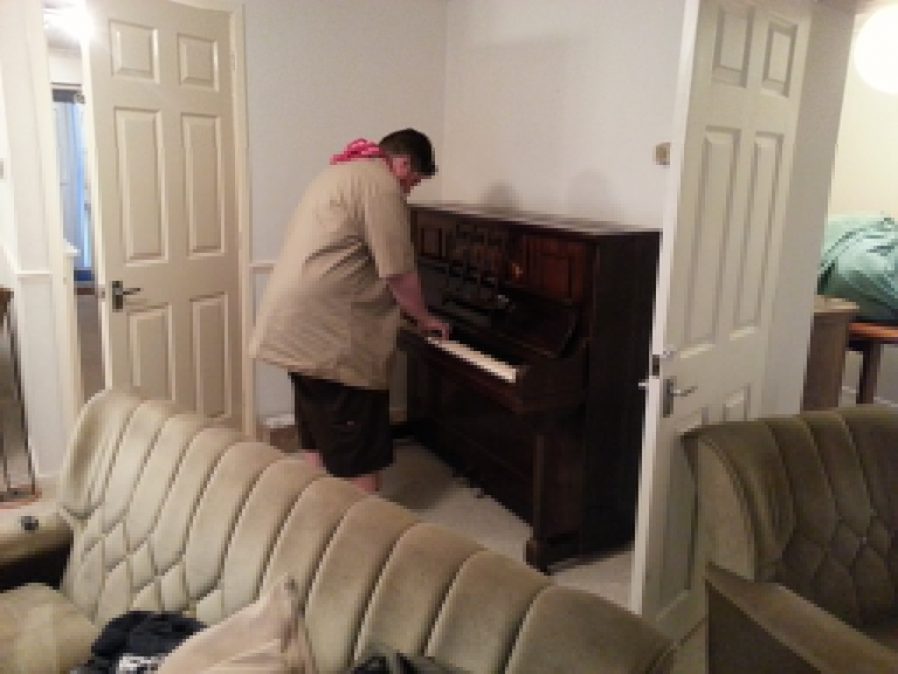
In order to minimise the amount of the deposit that we might otherwise lose, from our old place, and because we rightly anticipated being too exhausted from the move to do all of the requisite cleaning ourselves, we’d hired some professionals. By this point, we weren’t even able to think in terms of money like normal people – by the time you’re spending five figures on tax and lawyers, you find it pretty easy to shrug off the cost of a team of cleaners!

This did mean that Ruth and I had to each work from home, from the old house, for one last day while we let the cleaners, gardener etc. in. We left in the old house an absolute minimum of furniture: a single desk, chair, laptop computer, cup (for water), router, and cables.
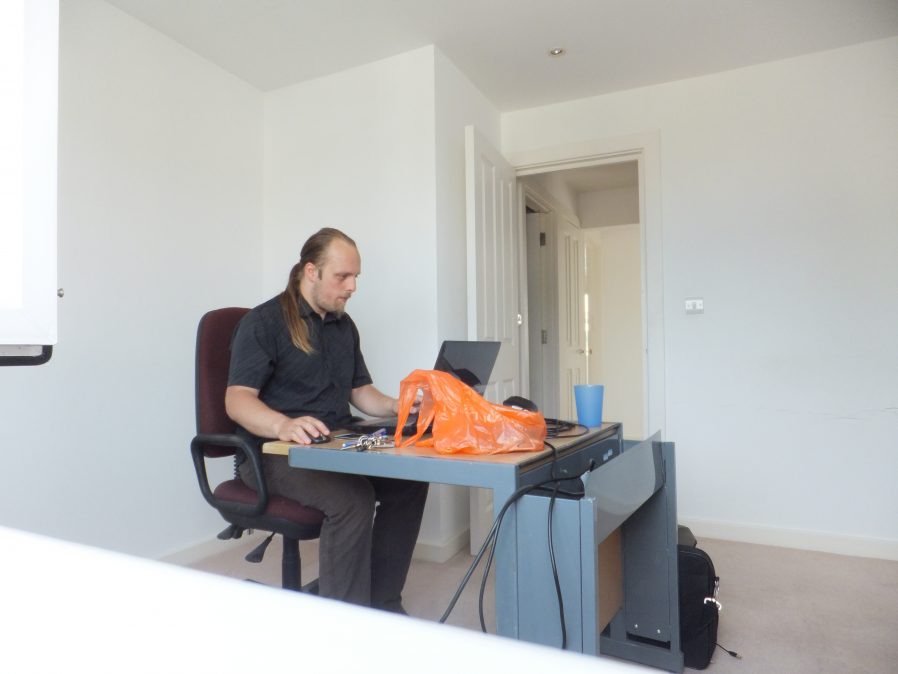
As I left the house for the last time, as empty and quiet as it was the day we first moved in, I felt a sense of serenity; a calm that came from a number of simultaneous realisations… that this was probably the last house move I’d have to do in a long while… that I finally lived somewhere that I didn’t (theoretically, at least) have to ask for somebody’s permission before I put a picture hook up or painted a wall… and that at long last I was paying off my own mortgage, rather than somebody else’s. It was the beginning of a new era.
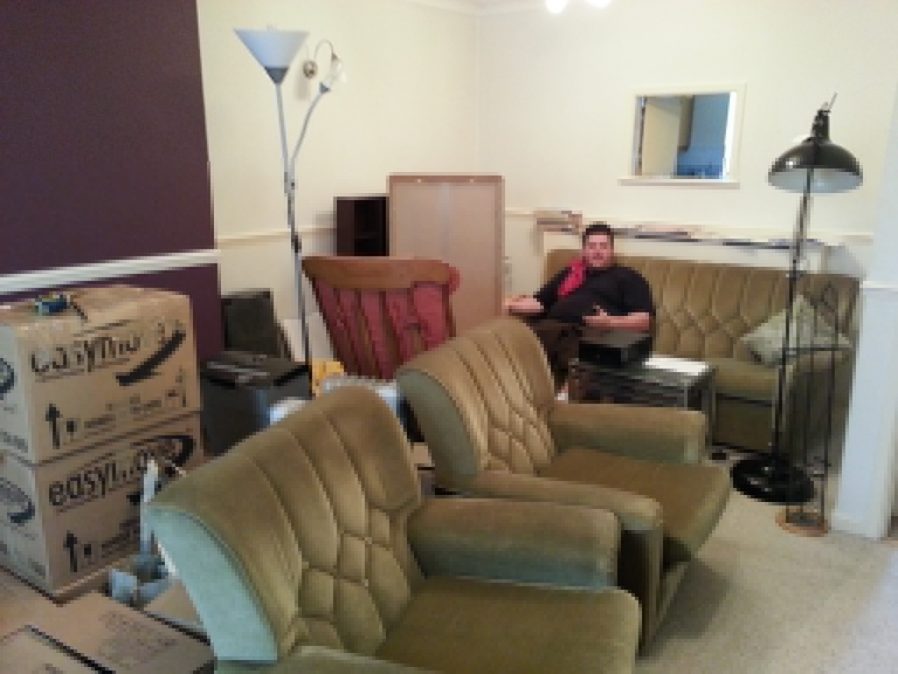
Changing tack from the theme by which our houses have been named since 2010, our new home is called Greendale. And yes, there’s a website (albeit a little sparse, for now). There’s always a website.
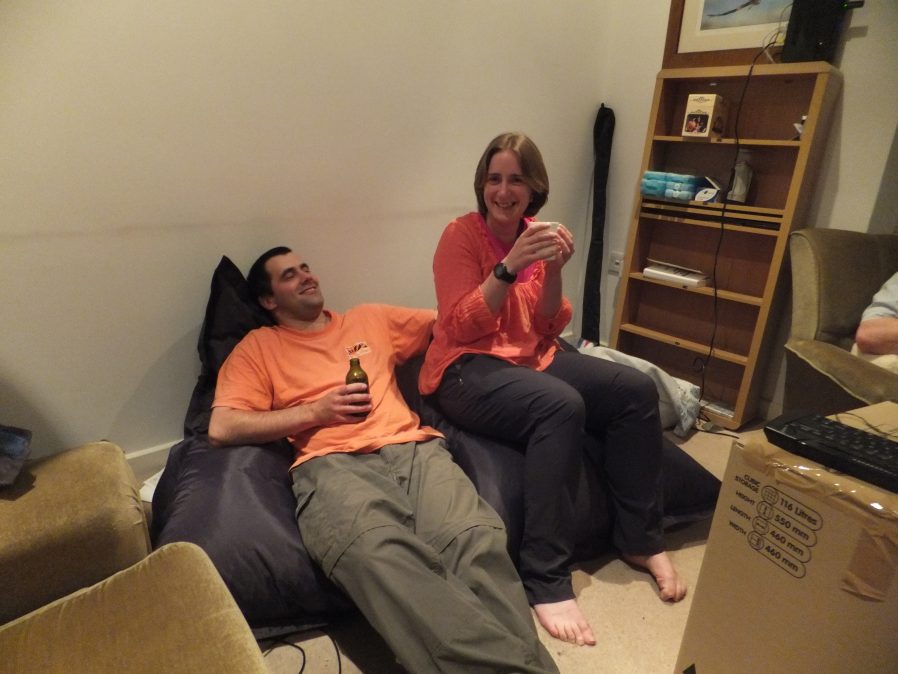
There’ll be a housewarming party on 22nd September: if you’re a friend of one or more of us, you’ve probably received an invitation already. But if you haven’t – and it’s not impossible, because we weren’t sure of everybody’s best email addresses these days – and you expect you should have, let me know. It’s not that we don’t love you: we just don’t love you enough to remember to invite you to stuff, that’s all.
Buying a House, Part 5
This blog post is the fifth in a series about buying our first house. In the third post in the series, we’d contracted some lawyers and applied for a mortgage, and in the fourth post we asked for help with the upcoming move. If you feel like we weren’t telling you the whole story, that’s because we weren’t: some of the bits we can now reveal were things that we needed to keep close to our chest while we were negotiating over the sale…
Things were continuing apace with our new house purchase, and that was the way that we wanted it. We’d had an offer accepted, applied for a mortgage (of which we’d been provisionally accepted already; this was just a paperwork affair), and our solicitors had gotten started with the searches and drafting the contracts. So long as the surveyor’s visit didn’t turn up any problems, we were on a roll.

Courtesy Google Maps.
Unfortunately, a few things did seem to be conspiring against us. The first was that the two sellers – a married couple who were in the middle of what appeared to be a… messy… separation – didn’t seem to be very communicative either with one another nor with their solicitor: or else, their solicitor was incredibly slow at relaying information back to our solicitor.

This posed a problem, because Ruth, JTA, Matt and I had already arranged with our letting agents that we’d be vacating our current house by the 5th of August. We’d left two clear weekends of possible “moving” time, but they were rushing up fast. Before the exchange of contracts, we couldn’t really let the sellers know how important it was that we complete the sale in a hurry, or else we’d be in a very weak negotiating position (and they’d be free to move the goalposts, knowing that we were running out of options). On the other hand, we really wanted to push to get the last couple of issues sorted out as soon as possible.
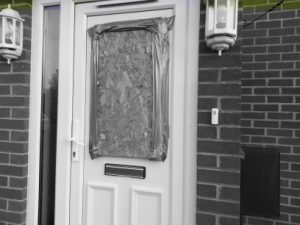
This ties in to the second thing that conspired against us: there were two particular issues with the house that we didn’t want to go ahead without resolving. The first was that the boiler hadn’t been serviced in a long time, so we insisted upon a gas safety inspection being carried out before we would exchange contracts. The second was that the front door was more “hole” than “door”, believed to have occurred during some kind of fracas between the owners (did I mention that their divorce was a little unpleasant?).
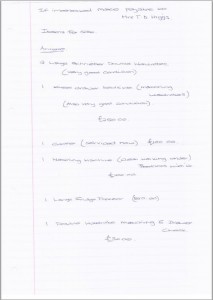
The gas safety inspection got sorted out after a while, but we went back and forth over the front door for what felt like an age. Who should repair it? Who should pay? We were told that the sellers were having cashflow problems and weren’t sure that they could pay for the repair of the door prior to the sale, but we weren’t happy to agree to the sale without a commitment that the door would be repaired by the completion (our insurer, answerable to our mortgage lender, wasn’t keen on us moving in to a house will a hole in it): we were at an impasse. So when the sellers produced for us a list of furniture they’d like to offer to sell to us, we noted with some suspicion that the total value of the furniture was remarkably close to the value of the quote for the repair of the door: clearly, they planned to offer to give us the furniture for “free” in exchange for not repairing the door.
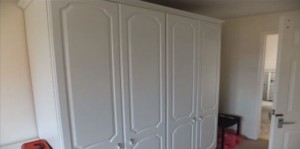
Which might have been fine, except for the fact that we didn’t want about half (by value) of the things they were offering. Having been living in unfurnished accomodation for several years, we’ve already got a sufficiency of wardrobes. We were keen to take their appliances off their hands (including a gas cooker and a very large fridge/freezer), but we weren’t willing to buy something that we didn’t need just so that they could find it easier to repair something that they broke! We made a number of other offers, such as lending them the money to repair the door (which they’d be able to pay us back following the sale), but they weren’t keen.

We put into place our emergency plan, and made arrangements to go and start viewing rental properties, in case we ran out of time and needed somewhere to live. JTA and I played “good cop, bad cop” with them in a spectacular tag team, leveraging this situation as a threat to pull out of the purchase entirely… and just like that, they caved. Within a day or so, their solicitor had agreed to the terms of our contract, and the sellers agreed to sort out the front door prior to completion of the sale, and we made sure to get it in writing. Our solicitor had already requested the money from our mortgage lender, so we agreed upon a completion date later in the week.

We popped open a bottle of prosecco and celebrated the successful exchange, and redoubled our efforts to fill our house with boxes, prior to the move.
Buying a House, Part 4 – Call To Arms!
This blog post is the third in a series about buying our first house. In the third post, Ruth, JTA and I had acquired some lawyers and started the conveyancing process…
We’re moving house! And we want your help!
There’ve been… a few hitches with the house move. A few little hurdles. And then a few big hurdles. It’s been a little challenging, is what I’m trying to say. I’ll write about that in Part 5, but for now: we need your help!
Here’s what we’ve got:
- A weekend in which we want to move (27th – 28th July).
- A van (probably).
- A lot of furniture, piles of boxes, and all the board games in the known universe. – a lot of stuff!
- Three people: one of whom has really dodgy knees, one of whom is pregnant, and one of whom managed to concuss himself last time he tried to move house – not the best crew in the world, perhaps.
- Lots of alcohol that needs drinking.
Here’s what we need:
-
A couple of extra pairs of hands who are willing to load and unload vans in exchange for:
- Pizza
- All the booze you can eat
- Being among the first to see our new home!
(cynical folks might notice that pizza, booze, rental vans and friends are a lot cheaper than professional removals companies, especially for short hops across to the other side of a city)
Simply put: we need you!
Can you help? Can you be free for some or all of the weekend of 27th & 28th of July, to come and shift boxes in exchange for good times, booze and snacks? If you are, we’d love to have you over. Ruth has written more about the wonderful perks that you’ll enjoy if you can help us, so – if you’re free and can get to Oxford – please come! And it’ll be lovely to see you, too!
Buying a House, Part 3
This blog post is the third in a series about buying our first house. If you haven’t already, you might like to read the first part. In the second post in the series, we’d put an offer on a house which had been accepted… but of course that’s still early days in the story of buying a house…
We hooked up with Truemans, a local solicitor, after discovering that getting our conveyancing services from a local solicitor is only marginally more-expensive than going with one of the online/phone/post based national ones, and you get the advantage of being able to drop in and harass them if things aren’t going as fast as you’d like. Truemans were helpful from day one, giving us a convenient checklist of all of the steps in the process of buying a house. I’m sure we could have got all the same information online, but by the time I was thinking about offers and acceptance and moving and mortgages and repayments and deposits and everything else, it was genuinely worth a little extra money just to have somebody say “next, this needs to happen,” in a reassuring voice.

Meanwhile, we got on with filling out our mortgage application form. Our choice of lenders – which Stefan, who I’d mentioned in the last post, had filtered for us – was limited slightly by the fact that we wanted a mortgage for three people, not for one or two; but it wasn’t limited by as much as you might have thought. In practice, it was only the more-exotic mortgage types (e.g. Option ARMs, some varieties of interest-only mortgage) that we were restricted from, and these weren’t particularly appealing to us anyway. One downside of there being three of us, though, was that while our chosen lender had computerised their application process, the computerised version wasn’t able to handle more than two applicants, so we instead had to fill out a mammoth 22-page paper form in order to apply. At least it weeds out people who aren’t serious, I suppose.

I revisited the house to check out a few things from the outside: in particular, I was interested in the front door, which had apparently been broken during a… misunderstanding… by the current owners, who are in the middle of what seems like a complicated divorce. The estate agent had promised that it would be repaired before the sale, but when I went to visit I found that this hadn’t happened yet. Of course, now we had lawyers on our side, so it was a quick job to ask them to send a letter to the seller’s solicitor, setting the repair of the door as a condition upon which the sale was dependent.
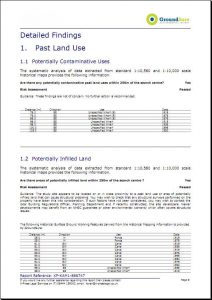
Our solicitors had also gotten started with the requisite local searches. One of the first things a conveyancing solicitor will do for you is do a little research to ensure that the property really is owned by the people who are selling it, that there’s no compulsory purchase order so that a motorway can be built through the middle of it, that it’s actually connected to mains water and sewers, that planning permission was correctly obtained for any work that’s been done on it, and that kind of thing. One of the first of these searches to produce results was the environmental search.

One of the things that was revealed be the environmental search was that the area was at a significantly higher-than-average risk of subsidence, had the construction not been done in a particular way – using subsidence-proof bricks, or something, I guess? I theorised that this might be related to the infill activities that (the environmental search also reported) had gone on over the last hundred and fifty years. The house is near a major waterway, in an area that was probably once lower-lying and wetter, but many of the small ponds in the area were filled in in the early part of the 20th century (and then, of course, the area was developed as the suburbs of central Oxfordshire expanded, in the 1980s). Conveniently, we have a librarian on our house-buying team, and he was able to pull up a stack of old OS maps showing the area, and we were able to find our way around this now almost-unidentifiable landscape.
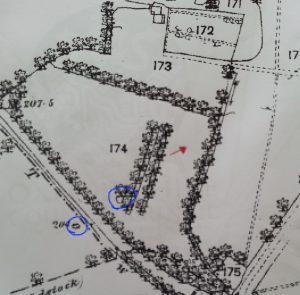
Sure enough, there were ponds there, once, but that’s as far as our research took us. Better, we thought, to just pass on the environmental search report to a qualified buildings surveyor, and have them tell us whether or not it was made out of subsidence-proof bricks or shifting-ready beams or whatever the hell it is that you do when you’re building a house to make it not go wonky. Seriously, I haven’t a clue, but I know that there are experts who do.

Given that the house we’re looking at is relatively new, I don’t anticipate there being any problems (modern building regulations are a lot more stringent than their historical counterparts), but when you’re signing away six-figures, you learn to pay attention to these kinds of things.
Hopefully, the fourth blog post in this series will be about exchanging contracts and getting ready to move in to our new home: fingers crossed!
Buying a House, Part 2
This blog post is the second in a series about buying our first house. If you haven’t already, you might like to read the first part.
When Ruth, JTA and I first set out to look at houses, we didn’t actually plan on buying one. We’d just gotten to the point where buying one felt like an imminent logical step, and so we decided to start looking around Oxford to see what kind of thing we might be able to get (and what it would cost us, if we did). Our thinking was that, by looking around a few places, we’d have some context from which to springboard our own discussions about what property we’d one day like to own.

There’s something about “window shopping” for houses that’s liberating and exciting. We don’t need a house – we’ve got somewhere to live – but we’re going to come and look around anyway. Once you’re on their lists, estate agents will bombard you with suggestions of places that you might like, and you feel a little like they’re your servants, running around trying to please you (in actual fact, almost the opposite is true: they’re working on behalf of the seller… although it’s certainly in their interest to get the property sold promptly so that they can take their cut!).

But as we got into the swing of things, we discovered that we were ready to buy already. Between our savings (and, in particular, boosted by the first parts of my inheritance following my dad’s death last year, as we’re finally getting his estate sorted out), we actually have an acceptable deposit for a mortgage, and our renewal on our current place was looming fast. None of us having bought a house before, we did a bit of reading and decided that our first step probably ought to be to work out how much can we borrow. You know, just to make our window-shopping a little more believable. Maybe.

Picture courtesy Google Maps.
One of the estate agents we dealt with introduced us to a chap called Stefan Cork, a mortgage broker working as part of the Mortgage Advice Bureau network. We were still only window-shopping at this point, but hey: if we were going to be allowed some free, no-commitment mortgage advice, then we might as well work out how much we could potentially borrow, right? After checking his credentials (the three questions you should ask every mortgage broker), I spoke to Stefan on the phone, and talked him through our situation. I described our unusual relationship structure (which he took in his stride) and the way that we means-assess our household contributions, alongside more mundane details like how much we earn and what kind of deposit we could rustle up. He talked us through our options and ballparked some of the kinds of numbers we’d be looking at, if we went ahead and got a mortgage.

And somehow, somewhere along the line, our perspective switched. Instead of looking at houses just to give us a feel for what we might buy, “maybe next year”, we were genuinely looking to buy a house now. We re-visited some of the places we’d seen already, and increased our search of places we hadn’t yet seen. Over time, and by a process of elimination (slow Internet area; too many hills; too narrow staircases; too expensive; too wonky), we cut down our options to just three potential properties. And then just two. And then we came to an impasse.
So… we put offers on both. Under the law of England and Wales, a property purchase isn’t binding until the contracts have exchanged hands. Sellers benefit (and buyers suffer) from this all of the time, because it permits gazumping: even after the buyers have spent money on lawyers, mortgage applications, surveys and searches, the seller can change their mind and accept a higher offer from a different prospective buyer! But this legal quirk can work for buyers, too: in our case, we were able to put offers in of what we were willing to pay for each of two properties (different values, at that), and let them know that the first one of the two to agree to our price would be the one to get the sale!

Haggling for a house in this way felt incredibly ballsy (I’d been nominated as the negotiator on behalf of the other Earthlings), but it played against the psychology of our sellers. Suddenly, instead of being in a position of power (“no, we won’t accept that offer… go a little higher”), the sellers were made to feel that if they didn’t accept our offers (which were doubtless lower than they had hoped), they’d have a 50% chance of losing the sale entirely. When there are hundreds of thousands of pounds on the line, being able to keep your cool and show that you’re willing to go elsewhere is an incredibly powerful negotiating tactic.
True to our word: when one of them came back and accepted our offer, we withdrew the offer on the other house and began the (lengthy) paperwork to start getting the purchase underway. But that can wait for another blog post.
Buying a House, Part 1
This blog post is the first in a series about buying our first house.
Today, I called up a man on the telephone and – on behalf of Ruth, JTA, and I – offered him several hundred thousand pounds in exchange for his house. Well, actually I spoke to the agent who represents him, but – crazy alternatives notwithstanding – I gather that’s sort-of the way that things are often done in the world of buying and selling property.

With house prices in Oxford averaging about twice the national average, it’s a genuinely scary thing to be doing, to be looking seriously at owning one. On the upside, once we’re done paying for it we could sell it and use the money to buy a yacht. On the downside, by the time we’re done paying for it the sea level may have risen by enough that we’ll need one.

House-hunting has been challenging, at times. The place that first caught our interest got quickly pushed down the list after we thought about the implications that the layout of rooms would have for us (as well as its crazy stairwell). The second place that we ‘connected’ with seemed like a clear winner; lots of great features for a very reasonable price. But then we tried cycling to it, and it turns out there’s no way to get there from Oxford without going over what JTA described as “a mountain”! And then, in case we needed more dissuasion, I looked at how far it was from the nearest telephone exchange, and discovered that broadband Internet access there would be only marginally faster than dial-up… until at least 2015. It doesn’t matter how good its countryside views are, it’s not worth trading high-def video for!


